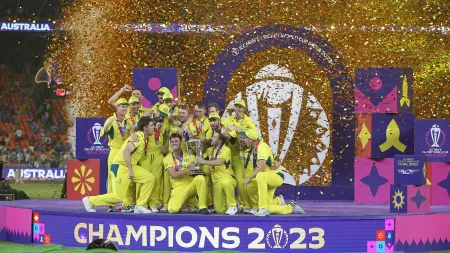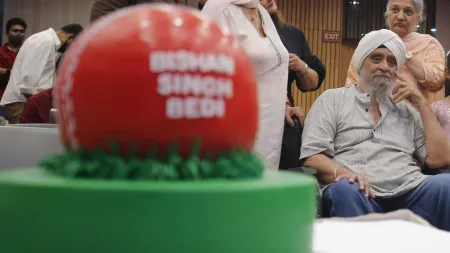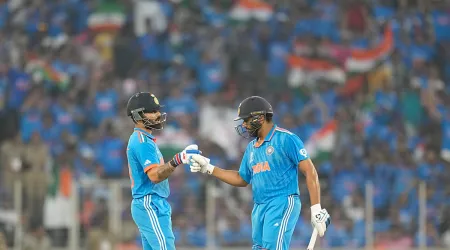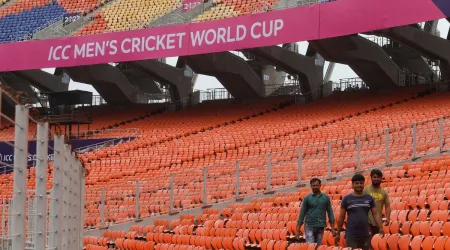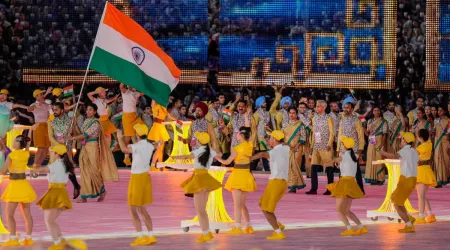- India
- International
Weapons in check-in baggage
The behavior of airport authorities, particularly in the US and China, has become ruthless since 9/11 attacks.
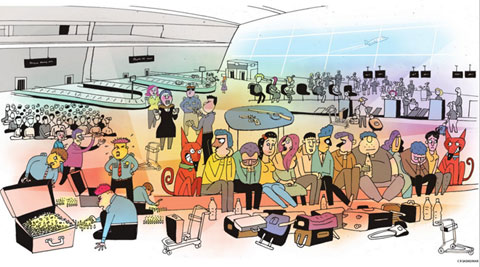 Illustration by C R Sasikumar
Illustration by C R Sasikumar
Last week, a group of top Indian shooters were stranded at the airport in Paris for 12 hours as the lengthy and complicated procedure to check in their weapons and ammunition made them miss their flight. In these times of highjacking fears and terror threats, Shahid Judge listens to the travel woes of the frequently flyers who go around the world with pistols, rifles and pellets.
The aircraft cargo hold is normally a restricted area for passengers. So, former international shooter Deepali Deshpande can proudly proclaim that she has been where not many are allowed. Though, at that time, she’d desperately wished she’d rather be at any place else.
The setting that evening in the mid-90s, seemed straight out of an action movie. The athlete was in transit at Hong Kong after flying down from Sydney, all set to board a flight home.
She found it odd that her name was called to the boarding gate before the doors officially opened to the passengers. An escort guided her all the way down to the cargo hold. No questions were asked; the language barrier wouldn’t allow it. Frantic gesticulation ordered her to enter a security van parked nearby. Sirens in the distance grew rapidly and she noticed armed policemen closing in on the van.
Inside she found her rifles neatly laid out on a table. An official ordered her to sit on the chair opposite while he furiously chatted with his colleagues in Mandarin. She recognised a copy of her gun permit with the pair. Deshpande sighed, but not necessarily out of relief. She knew the situation well.

She knew why she was in the van and she knew what she was about to be asked, probably through gestures. And so she decided to cut to the chase. She reached for her gun to point out its serial number. She remembers what followed with almost slow-motion recall.
The Olympian had barely touched her gun, but the sheer movement was enough for the two officials to shriek as if in counter. “It was all in a different language. But I could tell they were pretty angry,” she recalls. All of a sudden Deshpande wasn’t comfortable anymore.
She contemplated raising her hands in surrender, but realised she dare not move.
It seemed like an hour, but the matter was settled within 15 minutes of her entering the van.
A third official appeared and engaged the other two with equal animation. It seemed to the bewildered athlete that her papers were cleared. Deshpande was free to board the flight home, along with her bags, her gun, and a short-term fear of expecting similar chaos on future international flights.
One such case of confusion occurred last weekend in Paris. The Indian contingent at the International Shooting Sport Federation (ISSF) World Cup in Fort Benning found themselves stranded at the Charles de Gaulle Airport for 12 hours while on their way home.
The group was not allowed to board the Air France flight back to New Delhi on account of the airline not being informed of the guns in the athletes’ baggage. The plight actually began at Atlanta where the shooters, which included Olympic bronze medallist Gagan Narang, Commonwealth gold medallist Samresh Jung, Pemba Tamang, Jitu Rai and Raj Chaudhary, missed their scheduled KLM flight.
“The flight was over-booked and we got a little late because our guns were still going through the security checks when the gates closed,” says Jung.
The 43-year-old goes further to mention that shooters are accustomed to arriving at the airport at least four hours before departure. “With the amount of excessive checks we have to go through because of the guns, we’re quite used to being the last people to board the plane. So we are normally responsible for holding up flights,” he adds. Subsequently, the contingent was moved onto a Delta Airways flight to Paris where the final leg of the trip home was disallowed.
Incidentally, an Indian shooter was embroiled in arguments at Atlanta airport, enroute to Fort Benning, before the tournament began. Heena Sidhu, India’s first World Cup winner in a pistol shooting event, was not allowed to carry her guns outside Atlanta airport.
The American governing body in the sport, USA Shooting had not received government approval for the permit when the athlete arrived, ahead of the rest of the bunch. As a result, her arms and ammunition were confiscated by Customs. Frantic conversations with the NRAI found the Indian body sending a distress signal on behalf of its shooter.
The 12-hour time gap between the two nations too delayed the process. Eventually the permit came through after two days of Sidhu and her husband-coach Ronak Pandit shuffling between the tournament venue, the airport, and the Customs warehouse.
ARBITRARY CHECKS
More often than not, security personnel at various airports are found reacting spontaneously. It’s for this reason that Olympic gold and silver medallists Abhinav Bindra and Vijay Kumar advise shooters to stay away from certain airlines and airports that have notorious records. “Hong Kong and Dubai are the ones that we have been told to avoid. And so 99% of our shooters make sure that they do that because they have the strictest rules,” asserts Kumar.
But despite avoiding the infamous airports, shooters sometimes find themselves at the mercy of impulsive airport officials.
The Indian contingent sat on the floor at Guangzhou airport when it travelled to the city for a tournament a few years back. Customs officials did not have enough chairs to seat the 50-strong team, yet that was not the main concern.
The papers were all in order, but the officers were more worried about the number of pellets the team carried. Each member of the team had two boxes, which in turn held 500 pellets each. “Our manager broke his head trying to explain that all boxes were brand new and sealed by the manufacturer, but they wouldn’t listen,” says Suma Shirur.
The world record holder for the 10 metre air rifle event went further to claim that the brief detention gave the athletes a chance to get to know each other better. “We sat on the floor, gossiping and joking around while officials counted the pellets one at a time,” she laughs as she reminisces.
Shirur reckons the officials wouldn’t have counted any more than 1500 pellets before a senior officer gave them the clearance to proceed.
Athletes also had problems travelling domestically, despite their documents being legit. Asian Games and Commonwealth Games gold medallist Jaspal Rana remembers being stopped at the Delhi airport while travelling to Hyderabad for the 2003 Afro-Asian Games.
The then 27-year-old did win a silver medal at the event, for the 25 metre standard pistol, but angrily recalls that he was forced to send his guns to Hyderabad by train since the airline refused to let him travel with them.
Fellow pistol-shooter Samresh Jung remembers some ingenuinty in charming stern officials. “There’s this rule that only 5kg of explosives can be packed, including weight of the box. Once in China, I was stopped because it exceeded 5kg. We had metal boxes.
So we took some ammunition out and were weighing it, when this lady official came across the counter picked up the lock and put it on the weighing machine saying even the lock needed to be weighed in. Then I saw that the key was in the lock, so I cheekily took it out and told her we are not giving you the key. Even she started laughing. We’re immune to things like that,” he chortles.
FEAR OF TERRORISM
Modern technology has invented extensive methods of security. These measures, along with the terror threat, enforces authorities to substantially investigate each gun that passes through. The passenger’s paperwork too is intricately examined, and an air of suspicion is firmly stamped on the athlete. “There’s a difference between doing your job, and just being plain rude. Not everybody is a terrorist,” says Shirur, complaining that officials in America are more condescending than polite. “And then there’s the language problem in China,” she adds.
Over the years, shooters have come to acknowledge that behaviour of airport authorities, particularly in the United States and China, has become much more ruthless since the World Trade Centre Attacks of 2001. Veteran shooter Ashok Pandit recalls how he was allowed to pass freely in the United States when he travelled to Rhode Island to meet family, after participating in the Victoria (Canada) Commonwealth Games in 1994.
“Now there is always some problem when travelling with guns, no matter how organised you are,” he laments. He explains that shooting requires a stable and calm mind, void of stress and distractions. “Someone with experience, like me, would know what to expect, but imagine a young shooter travelling for the first time and having to go through the tension at the airport. It can be nerve-wracking and can affect performance,” he adds.
For Samresh Jung, there is one particular incident in which he was treated like a incendiary, though he can look back and laugh about it now. The Indian team was flying back from South Korea and had a stopover at Hong Kong. Before the plane could start taxying towards the runway, the team was told to disembark and were asked to open their luggage, which was checked-in at Korea, for inspection. “Four commandos approached me and asked me to open the box with my guns. The moment I opened it, two of them pulled me back as if there was a bomb inside,” he recollects.
Security is always the hurdle between the shooter and a peaceful trip. Yet, to be fair, the athletes commend the strict measures taken by airlines and airport authorities. “You can’t deny that they are simply doing their job and trying to prevent disasters. But for us, the only concern is the time it takes to get through the security check because we may have matches within a few hours. We don’t want to have to rush,” claims Olympian Joydeep Karmarkar before adding that the safety of the gun too is a worry. The subsequent statement refers particularly to the 34-year-old missing out on the 2010 Commonwealth Games because his rifle was broken on his way back from Fort Benning, prior to the Delhi event.
(With inputs from Bharat Sundaresan, Chinmay Brahme, Mihir Vasavda)


















